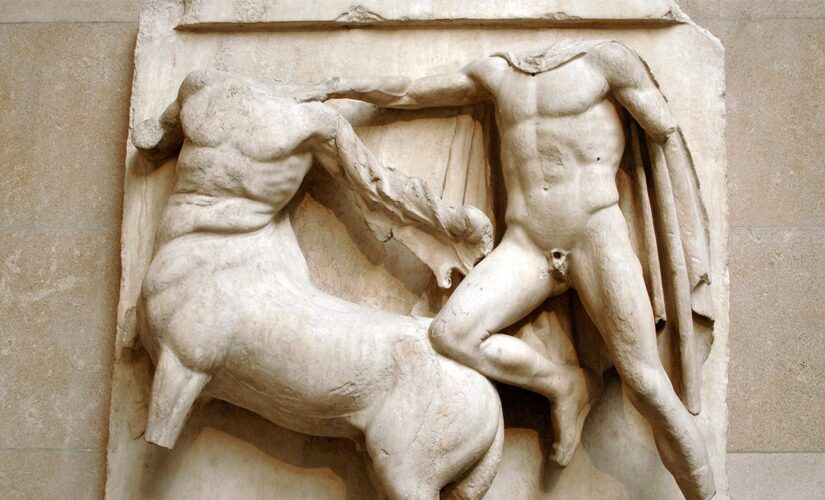The Parthenon marbles housed in the British Museum continue to occupy the foreground of an ongoing debate about art repatriation. After reports of a series of “secret” meetings regarding the sculptures, the U.K. government confirmed there would be no law change to facilitate their return to Greece.
Made between 447 and 432 B.C. under the supervision of the sculptor Phidias and his assistants, the marbles in the British Museum’s collection are displayed in the special-made Duveen Gallery, having once adorned the Parthenon atop Athens’ Acropolis. They consist of 15 metopes (sculpted relief panels), 17 pedimental figures and 247 feet of the original frieze. The sculptures depict impressive scenes of battle and festival procession, as well as gods reclining.
Altogether, the British Museum’s collection makes up half of the Parthenon’s surviving sculptures.
Leto, Artemis and Aphrodite from the Parthenon’s east pediment.
(VCG Wilson/Corbis via Getty Images)
RARE CIVIL WAR, WWI MILITARY ITEMS MADE BY TIFFANY & CO. TO HIT ILLINOIS AUCTION BLOCK
On Saturday, Greek newspaper Ta Nea revealed that since November 2021, the chair of the British Museum, George Osborne, has held a series of “secret” discussions on the return of the marbles with senior Greek government officials, including Prime Minister Kyriakos Mitsotakis. The latest meeting between Mitsotakis and Osborne was last week and insiders claim negotiations are at an “advanced stage.”
Greece has long maintained that the marbles were stolen and have campaigned for their repatriation. On the other hand, the British Museum, alongside the U.K. government, has defended its right to possess and display them.
At issue are the actions of Lord Elgin, the British ambassador to the Ottoman Empire at the beginning of the 19th century. Having been granted a permit, Elgin removed the sculptures and later sold them to the British government in 1816.
Elgin’s actions were investigated by a Parliamentary Select Committee in 1816 and found to be entirely legal, prior to the sculptures entering the collection of the British Museum by Act of Parliament. Since then, arguments against the legality of Elgin’s actions have focused on the original permit – namely, whether the Ottomans specifically authorized removal of the sculptures and whether they had the authority to do so in the first place.
Part of a metope depicting the battle between Centaurs and Lapiths.
(GraphicaArtis/Getty Images)
CELTIC GOLD COINS STOLEN FROM GERMAN MUSEUM IN STUNNING HEIST
The Greek government made its first official request decades ago, but for the first time in many years, the reunification of the Parthenon marbles in Athens’ specially designed Acropolis Museum looks like a real possibility.
At an event at the London School of Economics last week, Mitsotakis explained that progress was being made toward a “win-win solution” for the two sides. “I do sense the momentum,” Mitsotakis added.
A spokesperson for U.K. Prime Minister Rishi Sunak told reporters that while the trustees are free to talk to whomever they want, the U.K. government has “no plans to change the law, which prevents removing objects from the British Museum’s collection apart from in certain circumstances.”
FLORIDA BEACH’S MYSTERY DEBRIS UNCOVERED BY HURRICANE NICOLE LIKELY SHIPWRECK FROM 19TH CENTURY
Under the 1963 British Museum Act, objects can only be removed if they are “duplicates” or if “the object is unfit to be retained in the collections of the Museum and can be disposed of without detriment to the interests of students.”
A frieze which makes up part of the “Elgin Marbles.”
(Graham Barclay, BWP Media/Getty Images)
The British Museum responded to the reports in a Monday statement.
“We are seeking new positive, long-term partnerships with countries and communities around the world, and that of course includes Greece,” it said.
The Museum still intends to operate within the law, explaining it would not dismantle its collection “as it tells a unique story of our common humanity.”
CLICK HERE TO GET THE FOX NEWS APP
A compromise could see the marbles shared between the two countries.
However, former U.K. Culture Secretary Ben Bradshaw explained to Ta Nea: “I don’t think anyone is seriously thinking that when the marbles go back [to Athens] they won’t go back permanently.”




